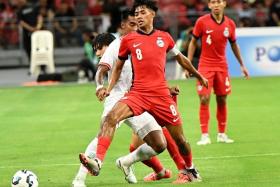4 criteria for Lions’ 5th regional title
Singapore's build-up for the AFF Suzuki Cup has been less than stellar. But, if they play their cards right, the Lions can surprise. Pundits The Straits Times spoke to list out the four elements which could fire the hosts to their fifth regional title.
It will take a brave man to bet on the Lions lifting their fifth Asean Football Federation (AFF) championship on New Year's Day.
Not only are world No. 160 Singapore ranked sixth in South-east Asia, they also kick off the AFF Suzuki Cup on Sunday on the back of five straight defeats, scoring just twice and conceding 21 goals.
They will have to contend with regional powerhouses like defending champions and world No. 99 Vietnam and five-time champions Thailand. Malaysia, Indonesia and the Philippines have all made strides and are strengthened by mixed-heritage or naturalised players.
Interestingly, while the Lions rarely go into the competition as favourites, they have managed to surmount considerable odds to be its second-most successful team with four crowns.
Analysts told The Straits Times there are four factors that could make the difference.
1. PREPARATION AND MORALE
Former Lions coach Radojko Avramovic, who oversaw three of their victorious campaigns in 2004, 2007 and 2012, said overseas training camps in South Korea, Thailand and Japan respectively helped immensely as the team could focus on fine-tuning tactics and building chemistry.
The 72-year-old Serb added: "Individuals may win you games. But, if they can have a good team preparation, build that togetherness and get everyone to fight for the same goal, they can win tournaments."
This year, however, the Lions' Nov 8-17 training camp was fraught with obstacles.
Skipper Hariss Harun and winger Hafiz Nor had Covid-19 and missed the Dubai trip, while defensive players Irfan Fandi, Safuwan Baharudin and M. Anumanthan were recalled by their overseas clubs midway through. However, team morale has been generally high.
Former national skipper and three-time champion Shahril Ishak said: "Usually, we are centralised (both locally and overseas) for up to a month in a distraction-free environment.
"This time, it feels less ideal because of Covid restrictions and foreign clubs' requirements. The team must find ways to overcome this and get into tournament mode quickly."
Comparatively, the Malaysia Cup, as well as the Thai and Indonesian leagues are ongoing, which have also hampered their respective national teams' preparations. Team Garuda did go to Turkey for centralised training but were able to call up just two players from each local club.
2. TACTICS AND INTENSITY
The Dubai tour seemed to have thrown up more questions than answers after Singapore lost 2-1 to Kyrgyzstan and 7-1 to Morocco 'A'.
One major dilemma is where to play Safuwan, a centre-back by trade but a central midfielder with his Malaysian club Selangor, and midfield linchpin Hariss, who had been filling in at the back for Lion City Sailors.
Former international defender R. Sasikumar, who scored the winner in the 1998 Tiger Cup, as the tournament was known then, said: "Playing Hariss at the back could work because I feel he can guide Irfan better in defence, while Safuwan's aerial ability could help the team win more possession in midfield."
Other issues he cited include how to fit in new citizen, South Korea-born Song Ui-young, in midfield, and whether Lions coach Tatsuma Yoshida has the tactical nous to turn things around when the chips are down.
In the 14 'A' internationals the Japanese has helmed since taking over in 2019, all against higher-ranked opponents, Singapore have come from behind to get results only twice - in the 4-3 win over Solomon Islands, which was Yoshida's first match in charge, and the 2-2 draw with Yemen.
The Lions have also appeared one-dimensional in recent friendlies, with a lack of a Plan B when the chips are down.
Hougang United coach Clement Teo also noted the dip in intensity after the coronavirus pandemic.
He said: "Singapore were starting to come into their own under Tatsuma in 2019 and played some good football and recorded some good results against Middle Eastern teams (they beat Palestine and Yemen and held Jordan).
"But they lost momentum when the pandemic hit and let's be honest, it is always going to be harder for us to pick up because the intensity in our domestic league is a long way off international standards."
3. AN IN-FORM STRIKER
A potential silver lining could be the availability of striker Ikhsan Fandi, 22. He has eight international goals from 19 caps and has been released by his Norwegian club FK Jerv to play in the Suzuki Cup, which is not held in a Fifa international window.
Despite Ikhsan getting just 639 minutes of game time with Jerv this year, the Suzuki Cup's all-time top scorer Noh Alam Shah (17 goals) said: "He is a complete striker who has the physical attributes and nose for goals. We need to build a team around him to allow him to do what he does best, which is scoring.
"Ikhsan is the only No. 9 and natural finisher we have, which is a concern. I hope the other forwards like Shawal Anuar, Gabriel Quak, Faris Ramli and Amy Recha, who operate more from wider positions and rely more on pace than aggression, can step up and contribute goals."
The goals seemed to have dried up of late. The Lions scored nine in Yoshida's first four matches, before netting just five more in their next 10 games. In total, Ikhsan and Quak scored thrice each, while Faris and Shahdan Sulaiman chipped in with two apiece.
Two-time Suzuki Cup winner Alam Shah noted that in the Lions' successful campaigns, there were strikers who shared the scoring responsibility.
He said: "In 1998, it was Rafi Ali and Ahmad Latiff; in 2004... there was Indra Sahdan and Agu Casmir; in 2007, there was Khairul Amri and I; and in 2012, there was Shahril Ishak and Aleksandar Duric.
"We couldn't score in the 2008 semi-finals because, although we had seven strikers, many... were ruled out by injury and Qiu Li was ineligible as Fifa changed its residency rule."
4. A BRIGHT START
Singapore kick off their Group A campaign against Myanmar on Sunday before facing the Philippines (Dec 8), Timor-Leste (Dec 14) and Thailand (Dec 18).
Most observers agree that with Myanmar in political turmoil and losing all five internationals this year with an aggregate score of 28-3, and world No. 194 Timor-Leste the lowest-ranked side, these two fixtures are must-win affairs for the hosts.
A positive result against the Filipinos, semi-finalists in four of the last five editions, should then see the Lions through to the last four. Their final group game against Thailand may not be a write-off, with the Thais having a new coach in Mano Polking after a poor World Cup qualifying campaign.
In Group B, Vietnam should progress even with just six goals in their last seven games, with the other spot between Malaysia and Indonesia.
Sasikumar said: "The Philippines will be able to call on many European-based players of mixed heritage from different foreign clubs, so they will have the edge in terms of physicality.
"But, as we have seen from the Asian Football Confederation Under-23 Asian Cup qualifiers, they may not be so familiar with each other and will rely more on individual brilliance rather than teamwork.
"On the other hand, when they come good, the Lions are greater than the sum of their parts. As hosts, they will also be training and playing in familiar conditions, although spectators will be limited. And once you get into the knockout stage, anything can happen.
"Vietnam and Thailand are rightfully the tournament favourites because they are at a higher level than the rest of Asean. But, perhaps with little to no expectations on the Lions to win the Cup, they can under-promise and over-deliver, like they have done before."
Get The New Paper on your phone with the free TNP app. Download from the Apple App Store or Google Play Store now



